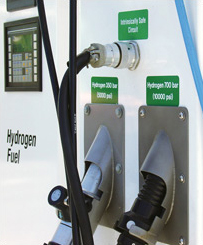Filling station
(Redirected from Gas stations)
Filling Station[edit | edit source]
A filling station, also known as a gas station or petrol station, is a facility that sells fuel and engine lubricants for motor vehicles. The most common fuels sold are gasoline (petrol) and diesel fuel. Filling stations may also sell other types of fuel, such as natural gas, hydrogen, ethanol, or biodiesel.
History[edit | edit source]
The first filling stations were simple facilities that provided fuel for early automobiles. These stations were often part of a general store or a blacksmith shop. As the number of automobiles increased, dedicated filling stations began to appear. The first purpose-built gas station was constructed in St. Louis, Missouri, in 1905.
Types of Filling Stations[edit | edit source]
Filling stations can be classified into several types based on the services they offer and the type of fuel they provide.
Full-Service Stations[edit | edit source]
Full-service stations offer a range of services beyond just fuel. Attendants may pump fuel, check oil levels, clean windshields, and perform minor maintenance tasks.
Self-Service Stations[edit | edit source]
Self-service stations allow customers to pump their own fuel. These stations are more common today and often have automated payment systems.
Alternative Fuel Stations[edit | edit source]
These stations provide fuels other than gasoline or diesel, such as compressed natural gas (CNG), liquefied petroleum gas (LPG), or electric vehicle charging.
Design and Layout[edit | edit source]
Filling stations are designed to efficiently serve a large number of vehicles. They typically include multiple fuel pumps, a convenience store, and sometimes a car wash.
Fuel Pumps[edit | edit source]
Fuel pumps are the primary feature of a filling station. They are equipped with hoses and nozzles to dispense fuel into vehicles. Modern pumps often have digital displays and card payment options.
Convenience Stores[edit | edit source]
Many filling stations have attached convenience stores that sell snacks, beverages, and automotive products. These stores can be a significant source of revenue for the station.
Environmental and Safety Considerations[edit | edit source]
Filling stations must adhere to strict environmental and safety regulations to prevent fuel spills and contamination. Underground storage tanks are used to store fuel, and these tanks are monitored for leaks.
Global Variations[edit | edit source]
Filling stations vary widely around the world in terms of design, services offered, and fuel types available. In some countries, stations may offer unique services such as tire repair or vehicle inspections.
Future of Filling Stations[edit | edit source]
With the rise of electric vehicles, the role of filling stations is evolving. Many stations are beginning to offer electric vehicle charging stations alongside traditional fuel pumps.
Related Pages[edit | edit source]
Search WikiMD
Ad.Tired of being Overweight? Try W8MD's physician weight loss program.
Semaglutide (Ozempic / Wegovy and Tirzepatide (Mounjaro / Zepbound) available.
Advertise on WikiMD
|
WikiMD's Wellness Encyclopedia |
| Let Food Be Thy Medicine Medicine Thy Food - Hippocrates |
Translate this page: - East Asian
中文,
日本,
한국어,
South Asian
हिन्दी,
தமிழ்,
తెలుగు,
Urdu,
ಕನ್ನಡ,
Southeast Asian
Indonesian,
Vietnamese,
Thai,
မြန်မာဘာသာ,
বাংলা
European
español,
Deutsch,
français,
Greek,
português do Brasil,
polski,
română,
русский,
Nederlands,
norsk,
svenska,
suomi,
Italian
Middle Eastern & African
عربى,
Turkish,
Persian,
Hebrew,
Afrikaans,
isiZulu,
Kiswahili,
Other
Bulgarian,
Hungarian,
Czech,
Swedish,
മലയാളം,
मराठी,
ਪੰਜਾਬੀ,
ગુજરાતી,
Portuguese,
Ukrainian
Medical Disclaimer: WikiMD is not a substitute for professional medical advice. The information on WikiMD is provided as an information resource only, may be incorrect, outdated or misleading, and is not to be used or relied on for any diagnostic or treatment purposes. Please consult your health care provider before making any healthcare decisions or for guidance about a specific medical condition. WikiMD expressly disclaims responsibility, and shall have no liability, for any damages, loss, injury, or liability whatsoever suffered as a result of your reliance on the information contained in this site. By visiting this site you agree to the foregoing terms and conditions, which may from time to time be changed or supplemented by WikiMD. If you do not agree to the foregoing terms and conditions, you should not enter or use this site. See full disclaimer.
Credits:Most images are courtesy of Wikimedia commons, and templates, categories Wikipedia, licensed under CC BY SA or similar.
Contributors: Prab R. Tumpati, MD








